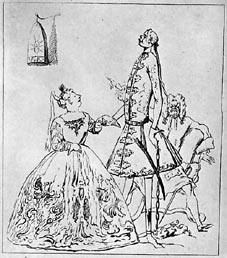 No, this isn’t the cover of my next book. It’s a splendid rendition by writer Delle Jacobs, wearing her designer hat, based on an etching by Fragonard called L’Armoire (the closet) after I’ve been tearing my hair out over a new title for my regency chicklit. Delle pointed out the interesting phenomenon of the hat held in place without benefit of hands.
No, this isn’t the cover of my next book. It’s a splendid rendition by writer Delle Jacobs, wearing her designer hat, based on an etching by Fragonard called L’Armoire (the closet) after I’ve been tearing my hair out over a new title for my regency chicklit. Delle pointed out the interesting phenomenon of the hat held in place without benefit of hands.
The marketing department at Avon decided that The Chronicles of Miss Wellesley-Clegg with the Occasional Scribbles of Mr. Inigo Linsley was a bit of a mouthful and might confuse booksellers. Furthermore, it’s no longer a romance/regency chicklit. I have been promoted to the status of a historical writer, and it will be released as a HarperCollins historical–ironic, since I consider this the most romance-y thing I’ve written. And my editor invited–or summoned–me to come up with a new title.
My first round of titles, including the brilliant Running with Rakes (suggested by my agent), were rejected as sounding too much like a romance. I suggested Mr. Darcy’s Trousers, which frankly I think says it all about why we like the Regency period. Nope, there’s nothing about Darcy in the book otherwise. My next batch included the immortal Gentlemen in Tight Trousers. Other (rejected) attempts were: The Smallest Room, Tart Rejoinders, Tart and Sweet, Present Imperfections, Tea and Scandal, The Happiest Delineations, and One Polish’d Horde (the last three after an evening with the Oxford Book of Quotations).
My additional challenge here is that the title has to indicate the book is funny, since this line seem to be quite serious, although very nice-looking with fine art and pretty squiggly things. I have yet to suggest Not Another Austen Knock-Off, but I’m keeping it in reserve.
So what makes a title? What makes a title specifically romance-y–is it random use of specific words like passion, scandal, savage, sweet, secret? And what makes a title specifically a historical title? Any thoughts? Or, more important, what makes a title work?
Janet
(hoping the title fairy as well as santa will visit soon)
P.S. Here’s an excerpt from the book from my website, www.janetmullany.com. And check out my Christmas recipe for Cranberry Nut Tart, too, while you’re there.











